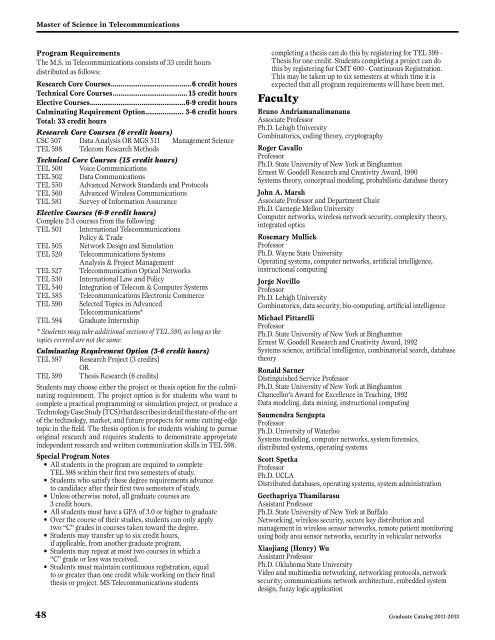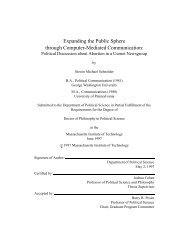Graduate Catalog 2011-2013 - SUNY Institute of Technology
Graduate Catalog 2011-2013 - SUNY Institute of Technology
Graduate Catalog 2011-2013 - SUNY Institute of Technology
Create successful ePaper yourself
Turn your PDF publications into a flip-book with our unique Google optimized e-Paper software.
Master <strong>of</strong> Science in Telecommunications<br />
Program Requirements<br />
The M.S. in Telecommunications consists <strong>of</strong> 33 credit hours<br />
distributed as follows:<br />
Research Core Courses...........................................6 credit hours<br />
Technical Core Courses........................................15 credit hours<br />
Elective Courses...................................................6-9 credit hours<br />
Culminating Requirement Option..................... 3-6 credit hours<br />
Total: 33 credit hours<br />
Research Core Courses (6 credit hours)<br />
CSC 507 Data Analysis OR MGS 511 Management Science<br />
TEL 598 Telecom Research Methods<br />
Technical Core Courses (15 credit hours)<br />
TEL 500 Voice Communications<br />
TEL 502 Data Communications<br />
TEL 550 Advanced Network Standards and Protocols<br />
TEL 560 Advanced Wireless Communications<br />
TEL 581 Survey <strong>of</strong> Information Assurance<br />
Elective Courses (6-9 credit hours)<br />
Complete 2-3 courses from the following:<br />
TEL 501 International Telecommunications<br />
Policy & Trade<br />
TEL 505 Network Design and Simulation<br />
TEL 520 Telecommunications Systems<br />
Analysis & Project Management<br />
TEL 527 Telecommunication Optical Networks<br />
TEL 530 International Law and Policy<br />
TEL 540 Integration <strong>of</strong> Telecom & Computer Systems<br />
TEL 585 Telecommunications Electronic Commerce<br />
TEL 590 Selected Topics in Advanced<br />
Telecommunications*<br />
TEL 594 <strong>Graduate</strong> Internship<br />
* Students may take additional sections <strong>of</strong> TEL 590, as long as the<br />
topics covered are not the same.<br />
Culminating Requirement Option (3-6 credit hours)<br />
TEL 597 Research Project (3 credits)<br />
OR<br />
TEL 599 Thesis Research (6 credits)<br />
Students may choose either the project or thesis option for the culminating<br />
requirement. The project option is for students who want to<br />
complete a practical programming or simulation project, or produce a<br />
<strong>Technology</strong> Case Study (TCS) that describes in detail the state-<strong>of</strong>-the-art<br />
<strong>of</strong> the technology, market, and future prospects for some cutting-edge<br />
topic in the field. The thesis option is for students wishing to pursue<br />
original research and requires students to demonstrate appropriate<br />
independent research and written communication skills in TEL 598.<br />
Special Program Notes<br />
• All students in the program are required to complete<br />
TEL 598 within their first two semesters <strong>of</strong> study.<br />
• Students who satisfy these degree requirements advance<br />
to candidacy after their first two semesters <strong>of</strong> study.<br />
• Unless otherwise noted, all graduate courses are<br />
3 credit hours.<br />
• All students must have a GPA <strong>of</strong> 3.0 or higher to graduate<br />
• Over the course <strong>of</strong> their studies, students can only apply<br />
two “C” grades in courses taken toward the degree.<br />
• Students may transfer up to six credit hours,<br />
if applicable, from another graduate program.<br />
• Students may repeat at most two courses in which a<br />
“C” grade or less was received.<br />
• Students must maintain continuous registration, equal<br />
to or greater than one credit while working on their final<br />
thesis or project. MS Telecommunications students<br />
completing a thesis can do this by registering for TEL 599 -<br />
Thesis for one credit. Students completing a project can do<br />
this by registering for CMT 600 - Continuous Registration.<br />
This may be taken up to six semesters at which time it is<br />
expected that all program requirements will have been met.<br />
Faculty<br />
Bruno Andriamanalimanana<br />
Associate Pr<strong>of</strong>essor<br />
Ph.D. Lehigh University<br />
Combinatorics, coding theory, cryptography<br />
Roger Cavallo<br />
Pr<strong>of</strong>essor<br />
Ph.D. State University <strong>of</strong> New York at Binghamton<br />
Ernest W. Goodell Research and Creativity Award, 1990<br />
Systems theory, conceptual modeling, probabilistic database theory<br />
John A. Marsh<br />
Associate Pr<strong>of</strong>essor and Department Chair<br />
Ph.D. Carnegie Mellon University<br />
Computer networks, wireless network security, complexity theory,<br />
integrated optics<br />
Rosemary Mullick<br />
Pr<strong>of</strong>essor<br />
Ph.D. Wayne State University<br />
Operating systems, computer networks, artificial intelligence,<br />
instructional computing<br />
Jorge Novillo<br />
Pr<strong>of</strong>essor<br />
Ph.D. Lehigh University<br />
Combinatorics, data security, bio-computing, artificial intelligence<br />
Michael Pittarelli<br />
Pr<strong>of</strong>essor<br />
Ph.D. State University <strong>of</strong> New York at Binghamton<br />
Ernest W. Goodell Research and Creativity Award, 1992<br />
Systems science, artificial intelligence, combinatorial search, database<br />
theory<br />
Ronald Sarner<br />
Distinguished Service Pr<strong>of</strong>essor<br />
Ph.D. State University <strong>of</strong> New York at Binghamton<br />
Chancellor’s Award for Excellence in Teaching, 1992<br />
Data modeling, data mining, instructional computing<br />
Saumendra Sengupta<br />
Pr<strong>of</strong>essor<br />
Ph.D. University <strong>of</strong> Waterloo<br />
Systems modeling, computer networks, system forensics,<br />
distributed systems, operating systems<br />
Scott Spetka<br />
Pr<strong>of</strong>essor<br />
Ph.D. UCLA<br />
Distributed databases, operating systems, system administration<br />
Geethapriya Thamilarasu<br />
Assistant Pr<strong>of</strong>essor<br />
Ph.D. State University <strong>of</strong> New York at Buffalo<br />
Networking, wireless security, secure key distribution and<br />
management in wireless sensor networks, remote patient monitoring<br />
using body area sensor networks, security in vehicular networks<br />
Xiaojiang (Henry) Wu<br />
Assistant Pr<strong>of</strong>essor<br />
Ph.D. Oklahoma State University<br />
Video and multimedia networking, networking protocols, network<br />
security; communications network architecture, embedded system<br />
design, fuzzy logic application<br />
48 <strong>Graduate</strong> <strong>Catalog</strong> <strong>2011</strong>-<strong>2013</strong>
















